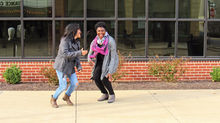"Hey, You! N*****!" The Process of Dehumanizing People
- Feb 5, 2017
- 4 min read
When I was thirteen years old, I took a walk with my friend down the road to McDonald’s. We got about halfway back when a car of high school guys rolled down the windows of their car, stuck their heads out and yelled, “hey you! Nigger!” I’d done nothing wrong. I didn’t know these people. Yet, for some reason, they felt they knew me, although the joke’s on them because Nigger is not my first, middle, or last name.
To be honest, I think of this occurrence a lot, as at the time, it hadn’t particularly bothered me. I hadn’t gotten overly offended. I didn’t go home and cry. I was really in a state of shock and confusion. Who were those guys? To this day, I still have no idea. Why did they feel the need to say that?
Whether we'd like to admit it or not, words hold an incredible power. Why else would Pres. Trump be so quick to snap at news reporters who try to tarnish his image, print or post articles that do not paint him in a positive light? Those words can go a long way. By tearing him down or building him up, the American people are apt to think either highly or poorly of him depending on whether or not they're reading about his great accomplishments, or tremendous failures. In school, we used to say, "sticks and stones may break my bones, but names will never hurt me," though is this entirely true? "Name-calling," or bullying, has pushed countless children to either attempt or commit suicide, resort to self harm, and other dangerous behaviors. The language we use is a key portion of our culture and identity, and it shapes the way we view the world as well as those in it.
Let's use that crying kid in the supermarket as an example. We've all been there before. He's on the ground, hooping and hollering because Mom won't get him another box of cookies (shouts out to you, Mom--hang in there!). Usually, we're very quick to dismiss him as a "brat," "spoiled," or even a "bad kid." Ok, but we're just a couple of folks standing around in the supermarket. What's that really going to do to this kid? Well, Crying Kid goes to school, where he is continually called a "bad kid," a "rotten child," a "spoiled brat," and so on. Eventually, Crying Kid is no longer Bobby or Evan, or whatever his name may be. He has become "bad kid." Instead of getting the help he needs, Crying Kid Bobby or Evan will be dismissed and passed along, for there's no need to help a child who's just a "bad kid," right? If that's what he is, we can't change it, right? Either that, or it is seen as too difficult or timely to even try, so Crying Kid Bobby or Evan goes on to live the rest of his school life as "bad kid."
Let's take it up a notch with the word nigger. By calling me a nigger rather than Reina, it reduces me to something that's less than what I am. It's reducing me to something that's less than human, which is what niggers or African slaves were considered only a mere 200 years ago. They were considered to be more animal or property than person, which helped to justify the horrific deeds being done to them. The same is done today. We think up a whole slew of degrading names for each other to reduce ourselves down to dirt, which makes it easier to do harm rather than help.
One of the keys to moving forward as a society, especially today with so much racial tension, is to remember the person. That boy in class you can't stand simply because he's different from you? He's still a boy. That girl at the office who drives you crazy? She's still a girl. This goes for every last one of us: put people first. As a special education major, we talk extensively about "people-first language," where the focus is on the person rather than whatever disability they may have.Instead of being a deaf person, your neighbor can be a person who is hard of hearing. Instead of being a mute person. your coworker can be a person who uses alternative communication to speak. Or, perhaps we can just call them Jeff and Grace? That person you saw get shot on their way to the store on the news was a person: a father, a husband, an office manager at the local health center named George McMullen. Instead of desperately figure out what his criminal record was, why not send a meal to his wife who just lost her life partner, and a card to his children who just lost their very own superhero? Of course, George McMullen is just a fictitious example, but the message still rings true.
Thankfully, as often as it comes to mind, this moment in my history as a young Black woman--girl, at the time--did not make me bitter, angry, or hurt. It got me thinking. It motivated me. After never having told anyone until now, I’ve come to realize that refusing to talk about or address a subject does not mean it doesn’t happen or never did; and even though it did happen, it doesn't mean I need to curl up into a ball and harden my heart. It means I stand up, pick up my pen, and use the power I have with my words for creating and empowering even more powerful and positive people.
What do you do with the powers you possess?
Best,
Reina







































Comments